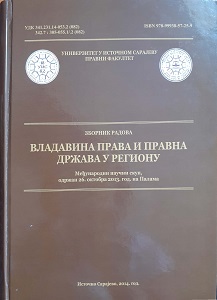Владавина права и пракса Уставног суда Босне и Херцеговине
The Rule of Law and the Case Law of the Constitutional Court of Bosnia and Herzegovina
Author(s): Miodrag N. Simović, Milena Simović
Subject(s): Constitutional Law
Published by: Правни факултет Универзитета у Источном Сарајеву
Keywords: Constitution of Bosnia and Herzegovina;Constitutional Court of Bosnia and Herzegovina;European Court of Human Rights;European Convention for the Protection of Human Rights and Fundamental Freedoms;
Summary/Abstract: Bosnia and Herzegovina is a state with a complex polity. The result of such a complex polity are various legal solutions, both at the same and at different levels of government, which are possible and in compliance with the constitutional organization of Bosnia and Herzegovina. Thus, in accordance with its competencies, the legislator enacts regulations for the same or different levels of power, which do not necessarily have to be identical. In its case law the Constitutional court of BiH often pointed out that the rule of law rests on two essential features, namely the equality of all before the law and the three branches of government. With regard to this, the Constitutional court highlights that legal certainty, inter alia, implies that the established mechanisms and institutions act in accordance with laws which are general, specific, unambiguous, constant and applied equally to everyone. This principle also implies the prohibition of arbitrariness in decision-making and conduct by all authorities which have to act exclusively in accordance with law and within the powers that are granted to them by law as well as the existence of institutional guarantees in that respect.The principle of independence of the judiciary, although not explicitly mentioned in the Constitution of Bosnia and Herzegovina, represents the general principle which must be complied with because it is inseparable from the principle of the rule of law expressed in Article I (2) of the Constitution of Bosnia and Herzegovina. The independence of the judiciary is the basis for division of power, while the judiciary is one of the three branches of power in every democratic state. It plays an important role in every democratic society. The judiciary is not only in the same position as the two other branches of power (executive and legislative), but it is also a special branch because it controls the other two branches of government. Moreover, the independence of judiciary is the foundation of the rule of law, democracy and respect for human rights. The achieved degree of independence of the judicial system is the key indicator of the achieved level of the rule of law in a democratic society. However, the principle of the rule of law and the independence of the judiciary as its inseparable part, particularly the principle of division of power, does not mean that the legislator cannot regulate by way of laws and regulations the issues important for the functioning of state institutions, even if this involves courts, but only as provided for and in accordance with the Constitution of Bosnia and Herzegovina.
- Page Range: 33-62
- Page Count: 30
- Publication Year: 2013
- Language: Serbian
- Content File-PDF

